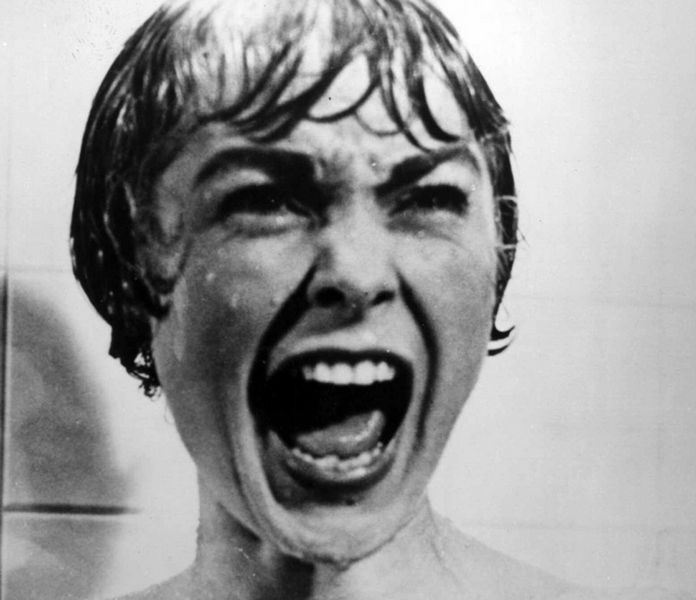Among Janet Leigh‘s last interviews was one she gave in July to the Sun-Times’ Miriam Di Nunzio about the DVD release of “The Manchurian Candidate.” Some excerpts:
On working with directors John Frankenheimer, Alfred Hitchcock and Orson Welles: “They were all geniuses. Hitchcock [‘Psycho’] did not like ad-libbing at all because everything was timed to perfection in his scenes. Orson loved ad-libbing. The whole [‘Touch of Evil’] script was skeletal. Frankenheimer liked spontaneity, but ‘Manchurian Candidate’ was too closely honed a story to really ad-lib much. There wasn’t a whole lot of that going on during filming.”
On “Psycho”: “It was me the whole time in that shower except for the time when he’s wrapping the body in the shower curtain. You always have a stand-in when you’re doing a film, and that was my stand-in. Otherwise, it’s me from start to finish.”
On being an actress: “[My family] was poor, and we moved so many times because my father had to find work, but movies took me everywhere in the world, to all these incredible places. I was Ginger Rogers. I was Norma Shearer. I was Joan Crawford. I could dance, I could sing. I knew I wanted to be in this business more than anything else in the world.”
Janet Leigh, who starred in one of the most famous scenes in movie history, is dead at 77. Miss Leigh, a top Hollywood star in the 1950s and 1960s and an intelligent and funny woman offscreen, “died peacefully at her home” on Sunday afternoon, a family spokeswoman said. At her side were her husband, Robert Brandt, and her daughters Jamie Lee Curtis and Kelly Curtis, who both followed her into acting.
“I will always be remembered for that one scene,” she told me one afternoon in 1998, as we shared a seat on the ski lift at the Telluride Film Festival. “That scene,” of course, was the one in Alfred Hitchcock’s “Psycho” (1960) where she is stabbed to death in a shower by a madman played by Tony Perkins. It was considered at the time the most violent scene to ever appear in a major movie, and Hitchcock’s friends feared it would harm his career; instead, the film was a box office triumph, hailed as a classic.
I asked her how it felt to always be asked about one scene, after a career that eventually included some 60 movies made between 1947 and 2000.
“Better to be remembered for one great scene than no great scenes,” she smiled. “If we fall out of this ski lift, they’ll mention the shower scene before they mention you.”
She was good company, having survived the Hollywood studio system and an eventful life that began when she eloped for her first marriage at 14, and for her third husband married Tony Curtis. Her fourth marriage, to Brandt in 1962, was long and happy. She was “discovered” by Hollywood in such an improbable way that it equals Lana Turner’s discovery at the counter of a soda fountain. The star Norma Shearer, once married to the powerful producer Irving Thalberg and still with influence at MGM, saw her photo on the hotel counter where Miss Leigh’s father worked, and told the studio to test her. They did.
Some thought “Psycho” a classic, some called it a scandal, but Miss Leigh appeared in at least two movies that rank among the best American films of all time: Orson Welles’ “Touch of Evil” (1958) and John Frankenheimer’s “The Manchurian Candidate” (1962). Restored versions of both films played theaters recently before being released in DVD versions.
She was at Telluride to celebrate the restoration of “Touch of Evil,” which the studio took away from Welles and recut. It was returned to its intended form on the basis of a long memo Welles dictated about the studio’s changes.
“This was something we had started 40 years ago, and it was time to finish it,” Miss Leigh said at Telluride. “They cheated Orson. And they cheated us. This is vindication.”
In “The Manchurian Candidate,” she plays a woman who meets Frank Sinatra, a brainwashed Korean war veteran, on a train. She quickly breaks off her engagagement, and begins a sudden romance with the Sinatra character. Their conversation on the train is beyond peculiar.
“Maryland’s a beautiful state,” she tells him. “This is Delaware,” Sinatra says, and she replies: “I know. I was one of the original Chinese workmen who laid the track on this stretch. But nonetheless, Maryland is a beautiful state. So is Ohio, for that matter.”
What does this mean? Is it some coded message, triggering responses that were hypnotically implanted in his mind by the Chinese Communists? Why does she end her engagement even before their first date, and marry him in such haste? Is she his handler? Is there a subterranean level of conspiracy below the surface of “The Manchurian Candidate?” Miss Leigh said it was possible, but she preferred to take the film at face value.
The shower scene in “Psycho” has been analyzed shot-by-shot as a masterpiece of editing. Although the viewer has the impression of Miss Leigh’s nudity, the editing avoids actual nudity, in keeping with the Hollywood production code at the time. The final shot, of her blood curling down the drain, was the reason Hitchcock filmed in black and white: He felt if the blood were red, it would seem so real that audiences would be offended.
Many years later, Saul Bass, who designed the film’s titles, claimed that Hitchcock let him direct the shower scene. Miss Leigh was outraged: “Absolutely not! I was in that shower for seven days, and believe you me, Alfred Hitchcock was right next to his camera for every one of those 70-odd shots.”
Her daughter, Jamie Lee, later starred in the famous series of “Halloween” horror films, and Miss Leigh appeared in one of them, “Halloween H20: 20 Years Later” (1998).
She never won an Oscar, but was nominated for “Psycho” and won the Golden Globe that year. Among her many other films, some of the best included “Scaramouche” (1952); Anthony Mann’s “The Naked Spur” (1953), opposite James Stewart; “Harper” (1966), with Paul Newman, and “Houdini” (1953), playing the magician’s wife, opposite Curtis in the title role.
She had been in good health until the last year, when she fell victim to vasculitis, an inflammation of the blood vessels.
After filming the shower scene, she often said, she refused to take another shower, and took only baths. She liked the story Hitchcock told, about a woman who wrote him complaining that after seeing his shower scene, and a drowning in a bathtub in “Diabolique” (1955), her daughter refused both to shower and to bathe. “What should I do with her?” she asked the Master of Suspense, who suggested: “Send her to the dry cleaners.”












